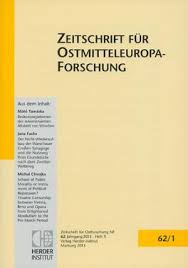Aus der Vorgeschichte der Ostpolitik. Literaturtransfer zwischen der Bundesrepublik Deutschland und der Volksrepublik Polen im kulturpolitischen Kontext (1960-1970)
On the Prehistory of Ostpolitik. Transfer of Literature Between the Federal German Republic and the Polish People’s Republic in the Context of Cultural Policies (1960-1970)
Author(s): Paweł ZajasSubject(s): Cultural history, Political history, Comparative Study of Literature, German Literature, Polish Literature, Peace and Conflict Studies
Published by: Verlag Herder-Institut
Keywords: cultural policies; Polish-German literature transfer; Siegfried Unseld archive; policontextural ontology of literature; publishing companies;
Summary/Abstract: This paper attempts to analyse Polish-German literature transfer that was embedded in the heteronomous field of foreign cultural policies in the years 1960-1970. The primary data derives from the Political Archive of the Foreign Office (Politisches Archiv des Auswärtigen Amts in Berlin). In particular, the focus of the paper is on the reports of the Trade Representatives of FGR in Warsaw, the correspondence of the individual cultural intermediaries (Karl Dedecius and Hermann Buddensieg among others), publishing houses and organisations operated and financed by the West German Ministry for Foreign Affairs (Inter Nationes, Börsenverein des Deutschen Buchhandels, Martin-Behaim-Gesellschaft). The stance of the government institutions is confronted with the policy of private publishers. Such a comparison has been enabled through an investigation into the material collected in the course of archival research in Siegfried Unseld Archiv preserved in Deutsches Literaturarchiv in Marbach. The archival material has enabled employing the so-called policontextural methodological perspective (Niklas Luhmann). The perspective underlines the multiplicity of vantage points that in turn affect the current multiple definitions of literature, the latter functioning in parallel. The framework allows asking the question as to the ways in which the political circles defined the function of literature and how the literary system responded to these external influences. A policontextural analysis of the archival data yields two new research outcomes. Firstly, the historiographic aspect of research results proposes a correction of the periodisation of the entire cultural policy of FRG and Polish-West German cultural relations. The second finding is of a methodological nature and pertains to the rule of hierarchical ordering of the cultural field (autonomy vs. heteronomy). In the light of the study, the military rhetoric of conflict (Bourdieu) should be broadened to include versatile forms of cooperation.
Journal: Zeitschrift für Ostmitteleuropa-Forschung
- Issue Year: 66/2017
- Issue No: 1
- Page Range: 70-98
- Page Count: 29
- Language: German

